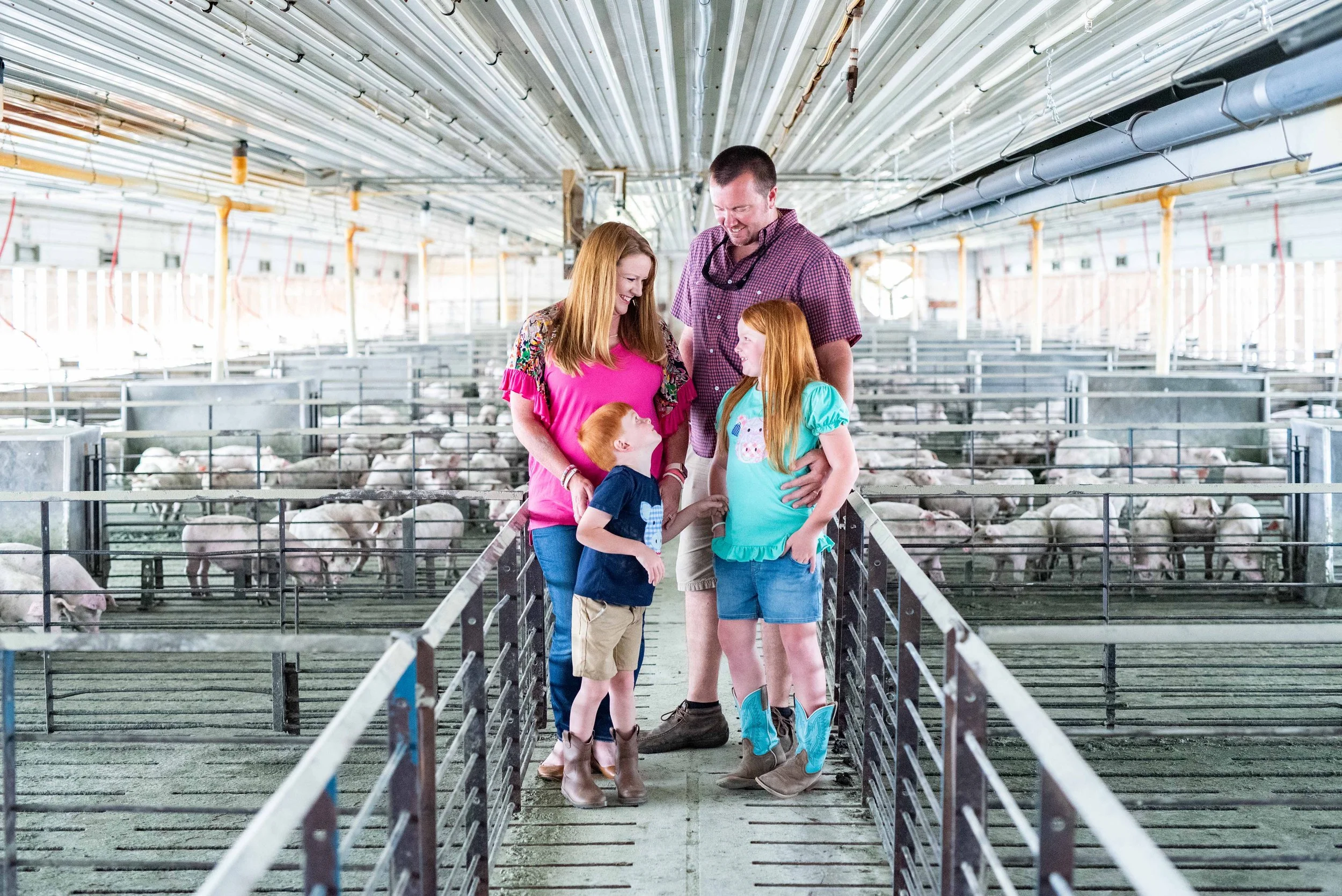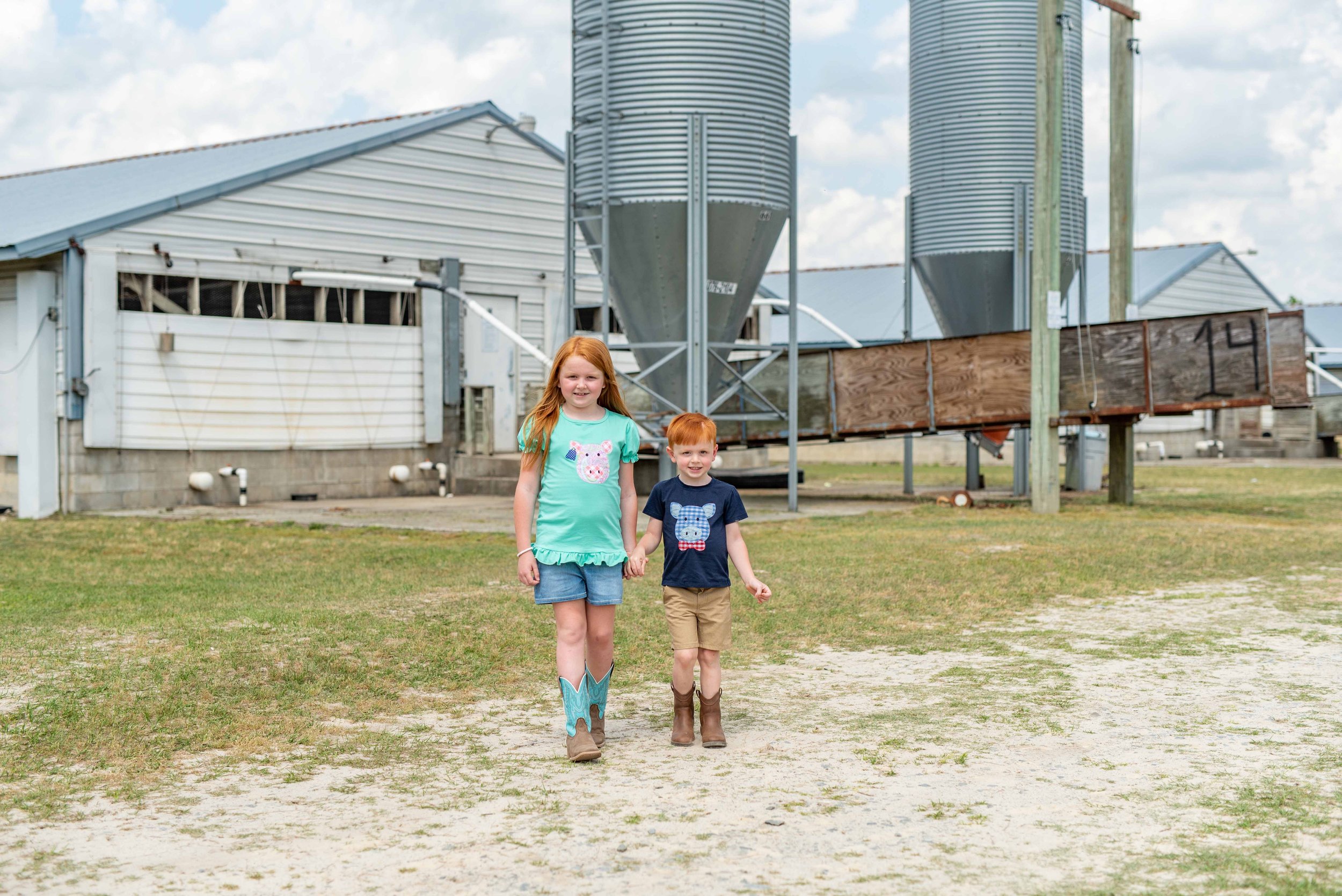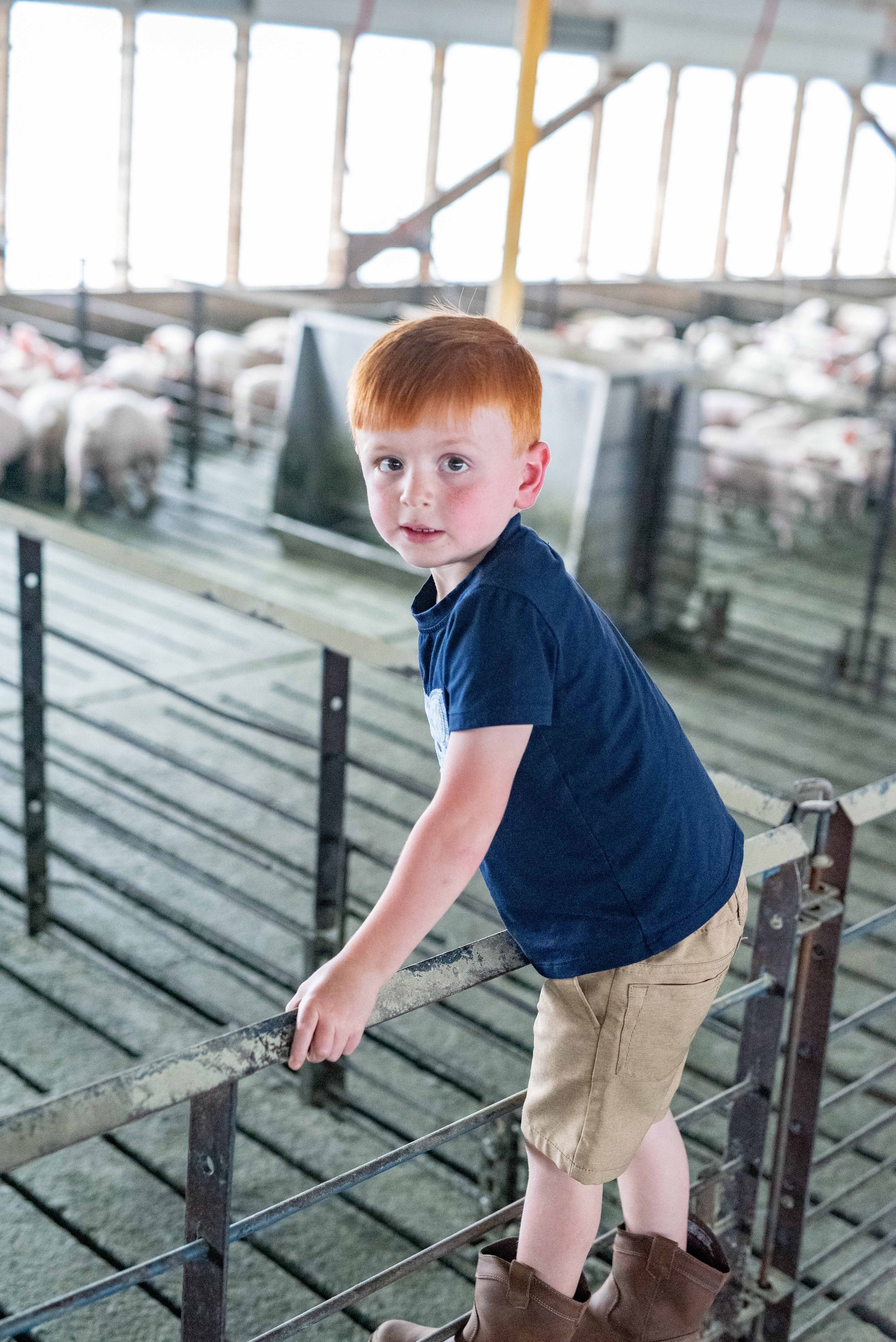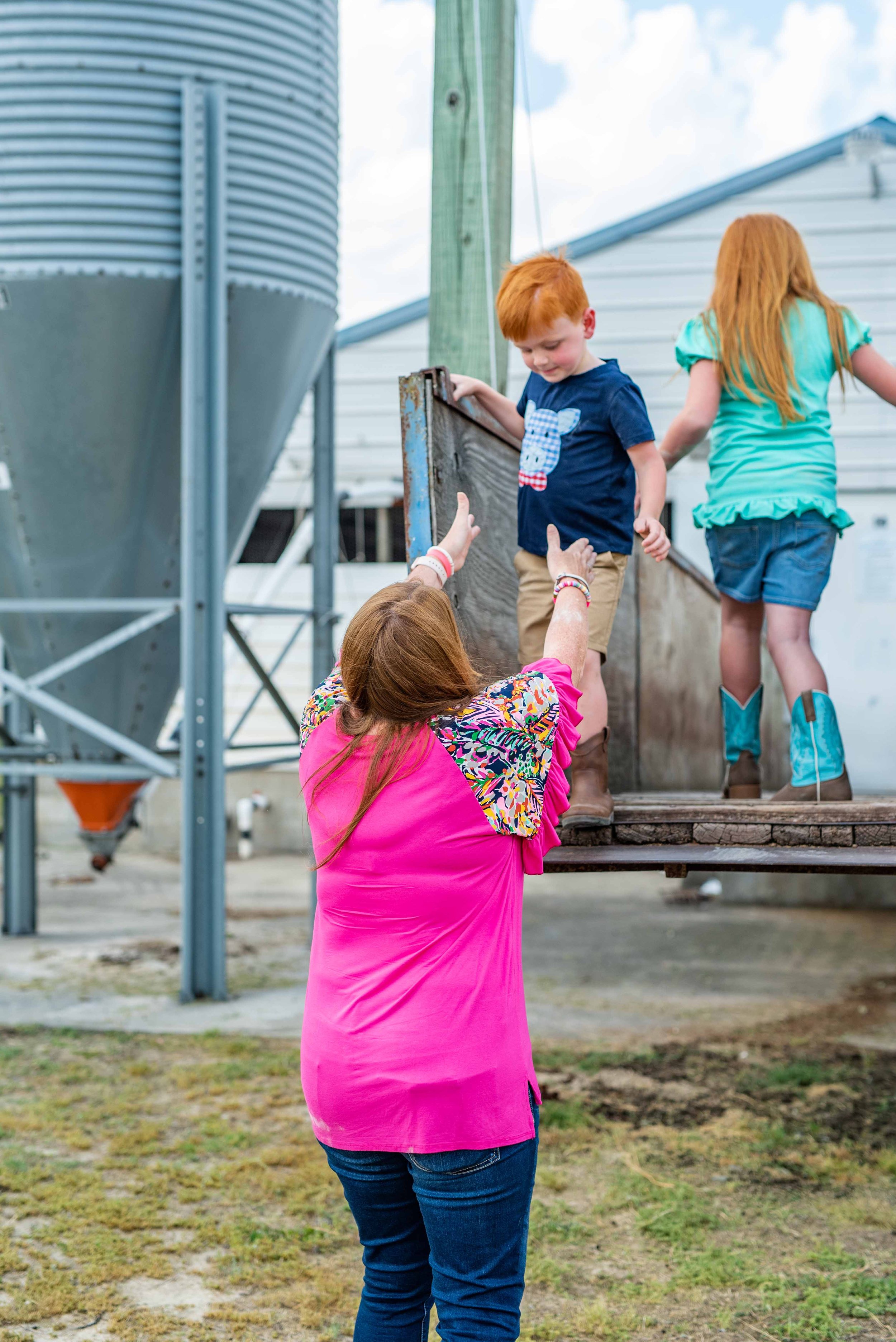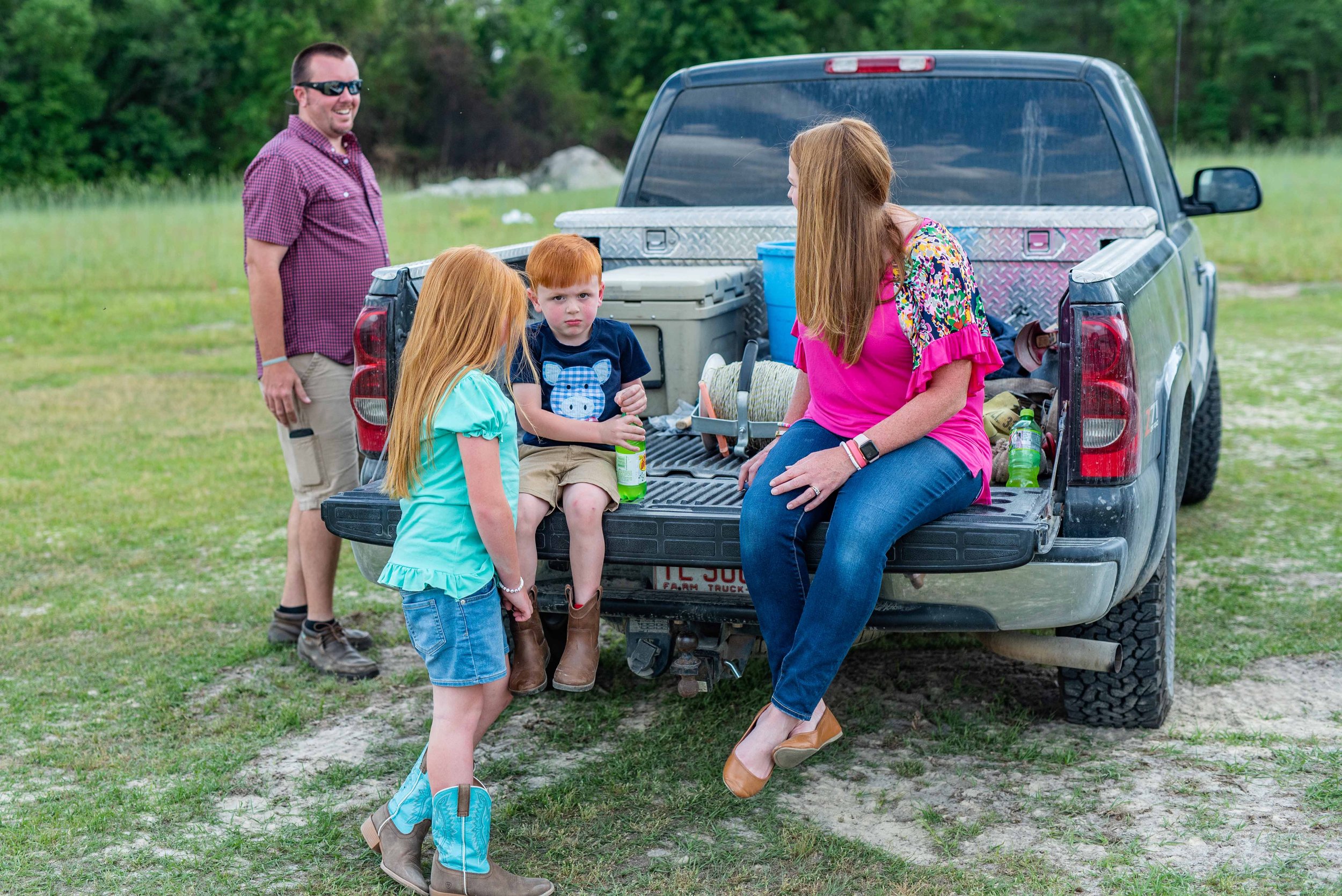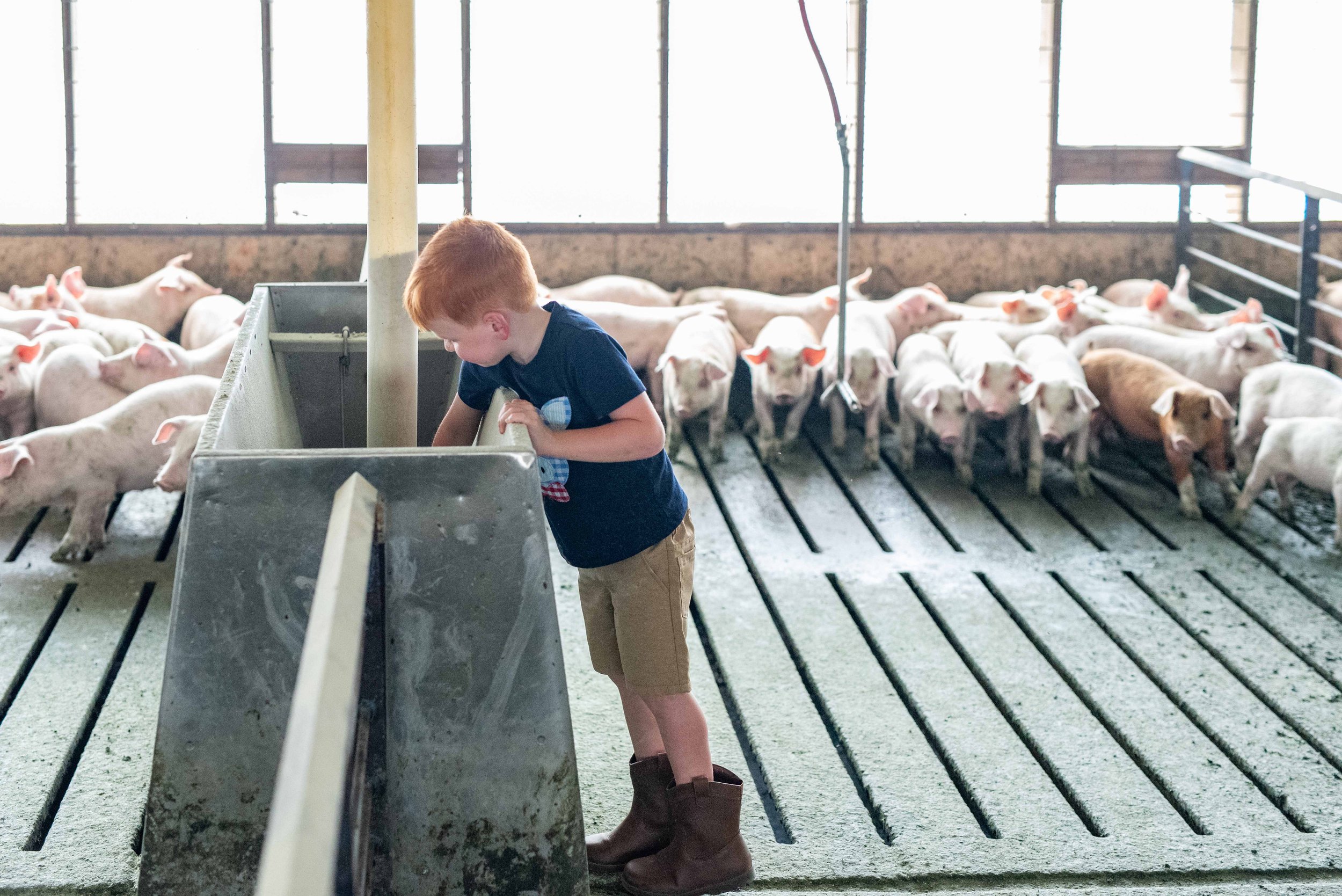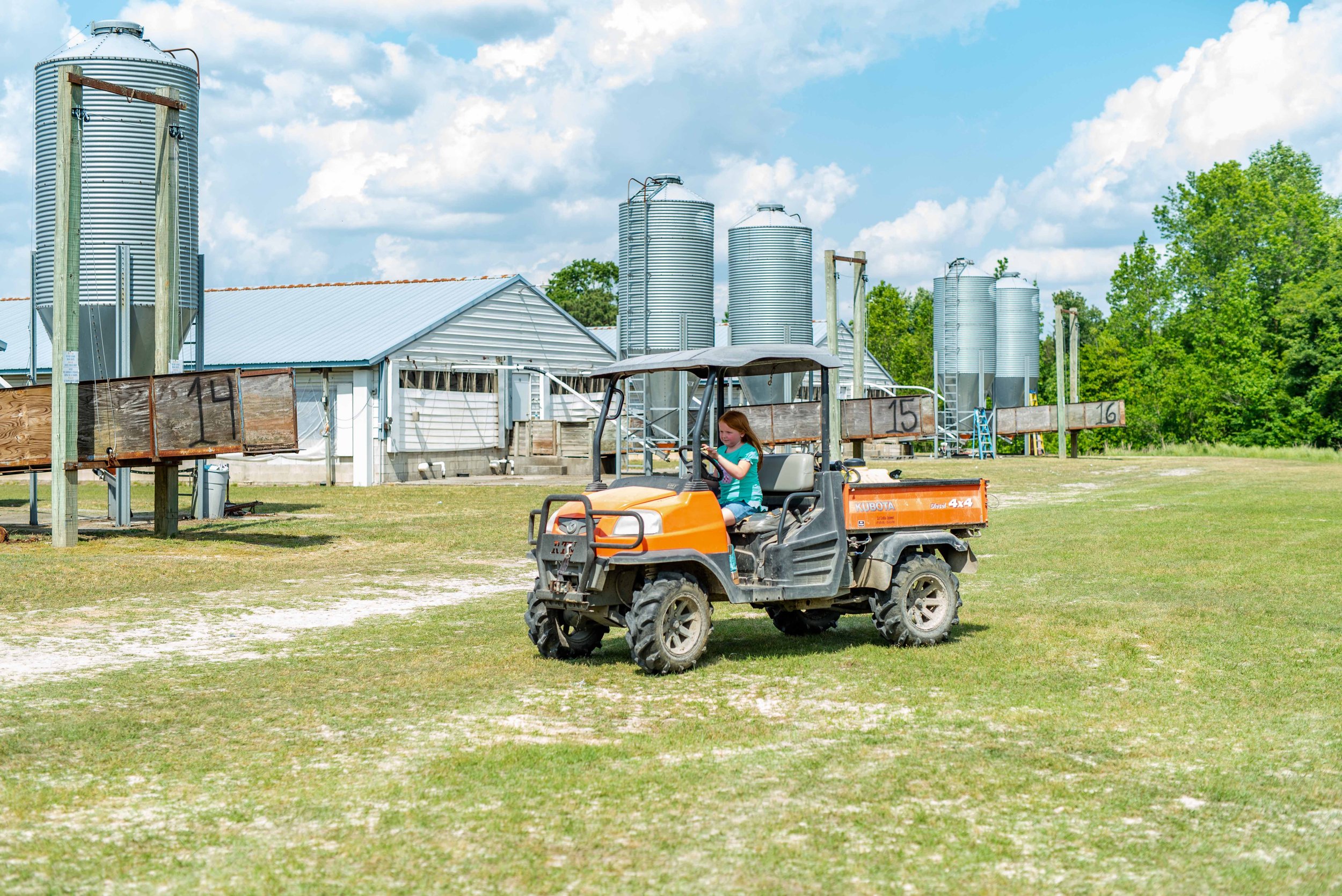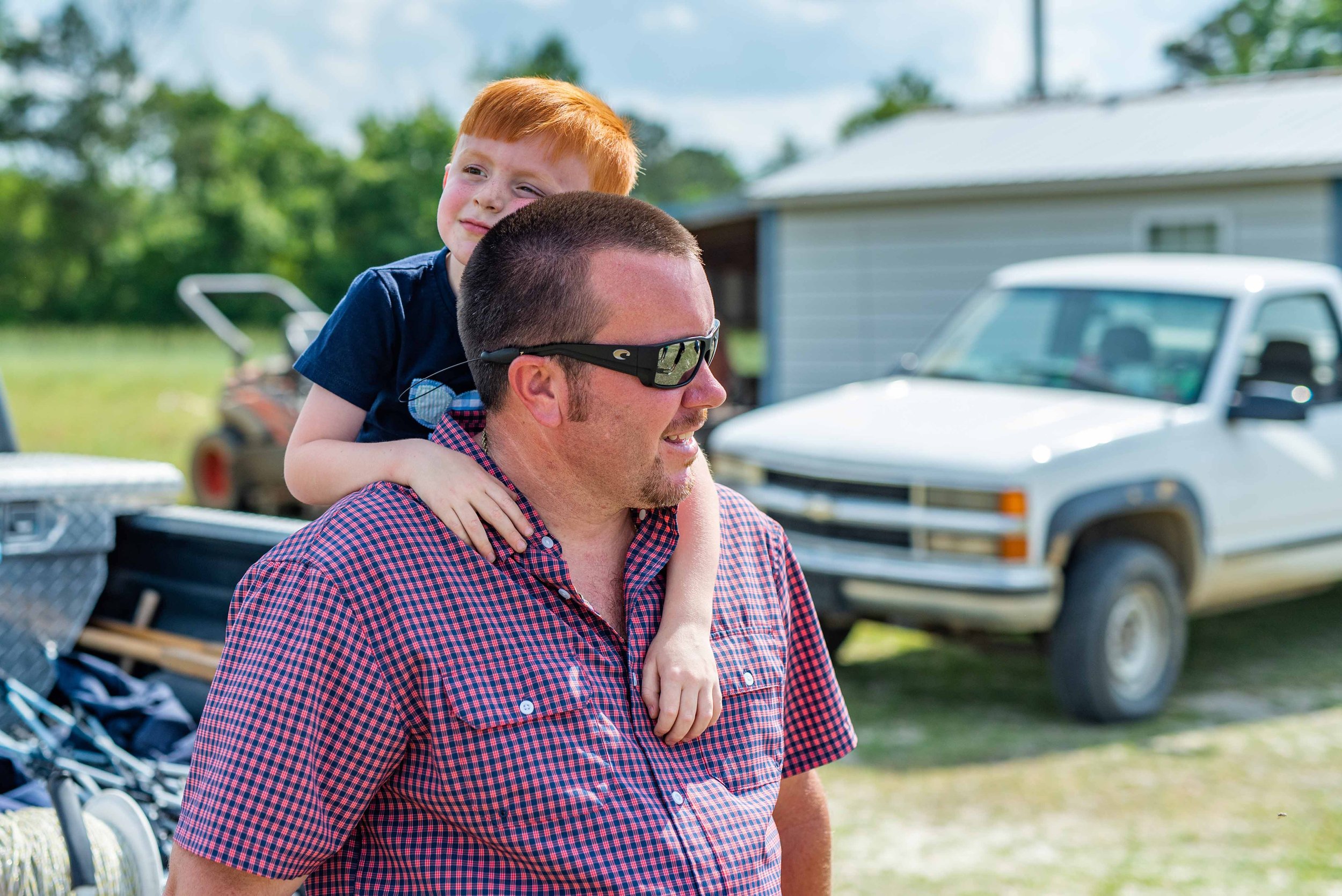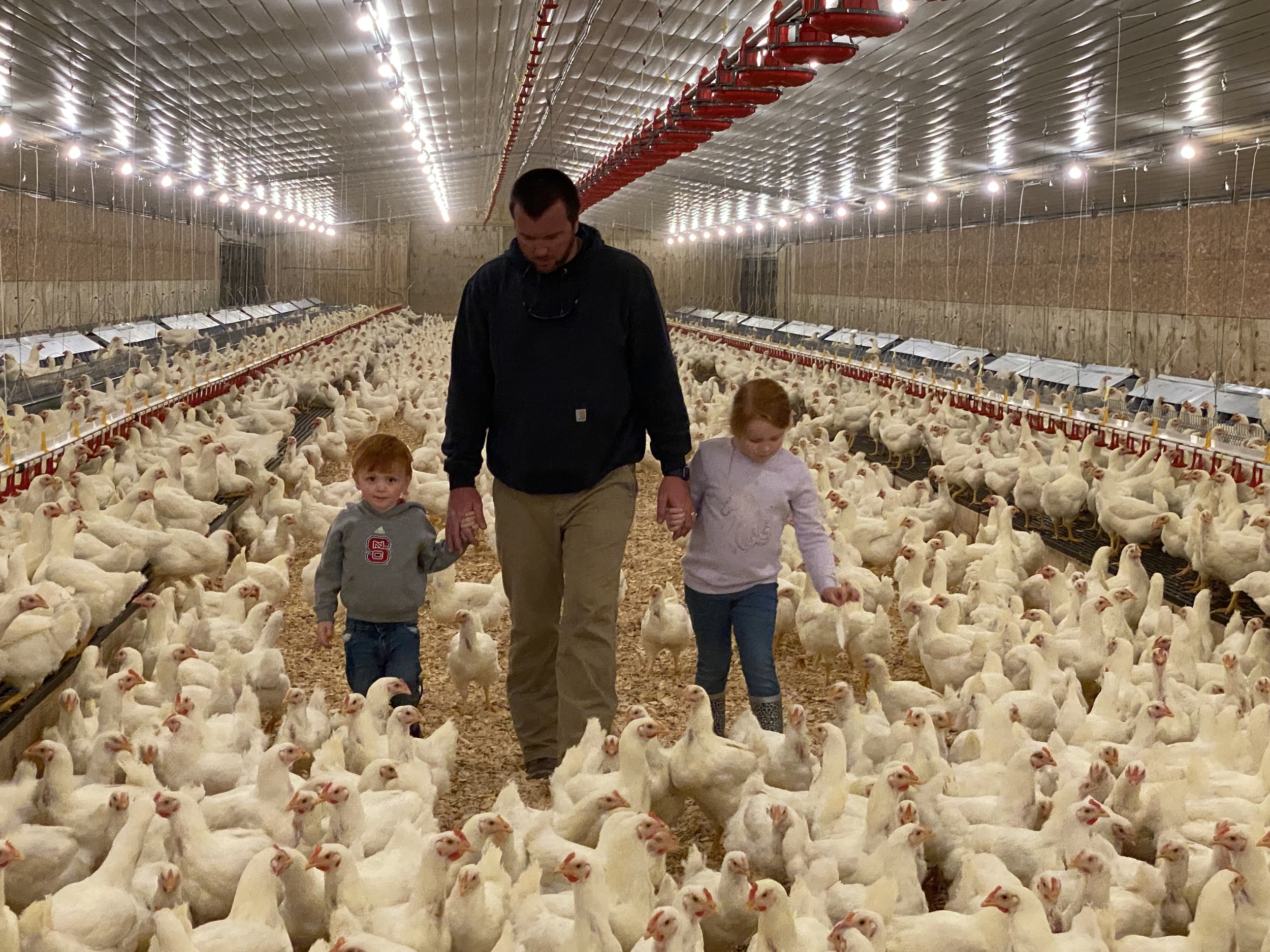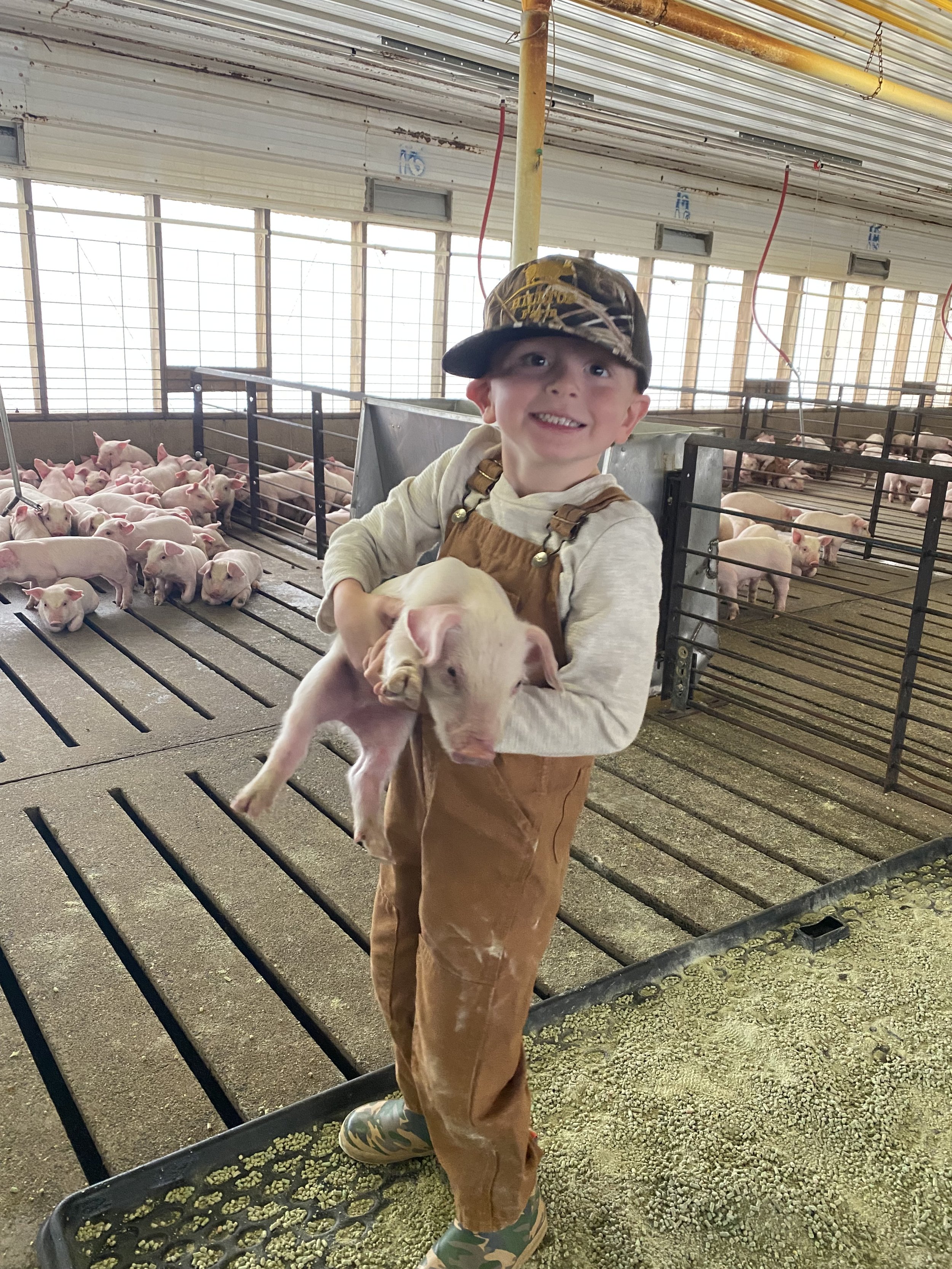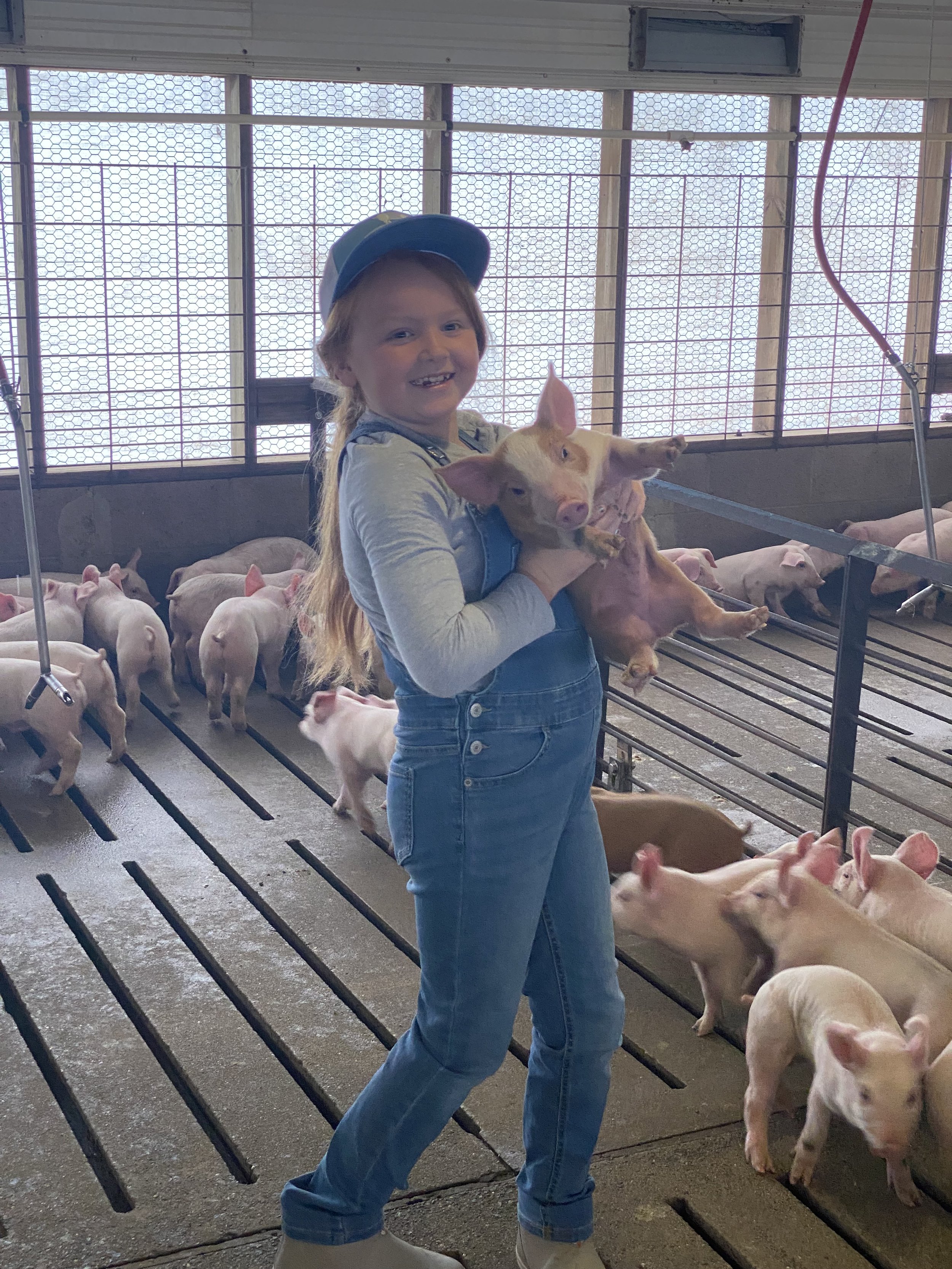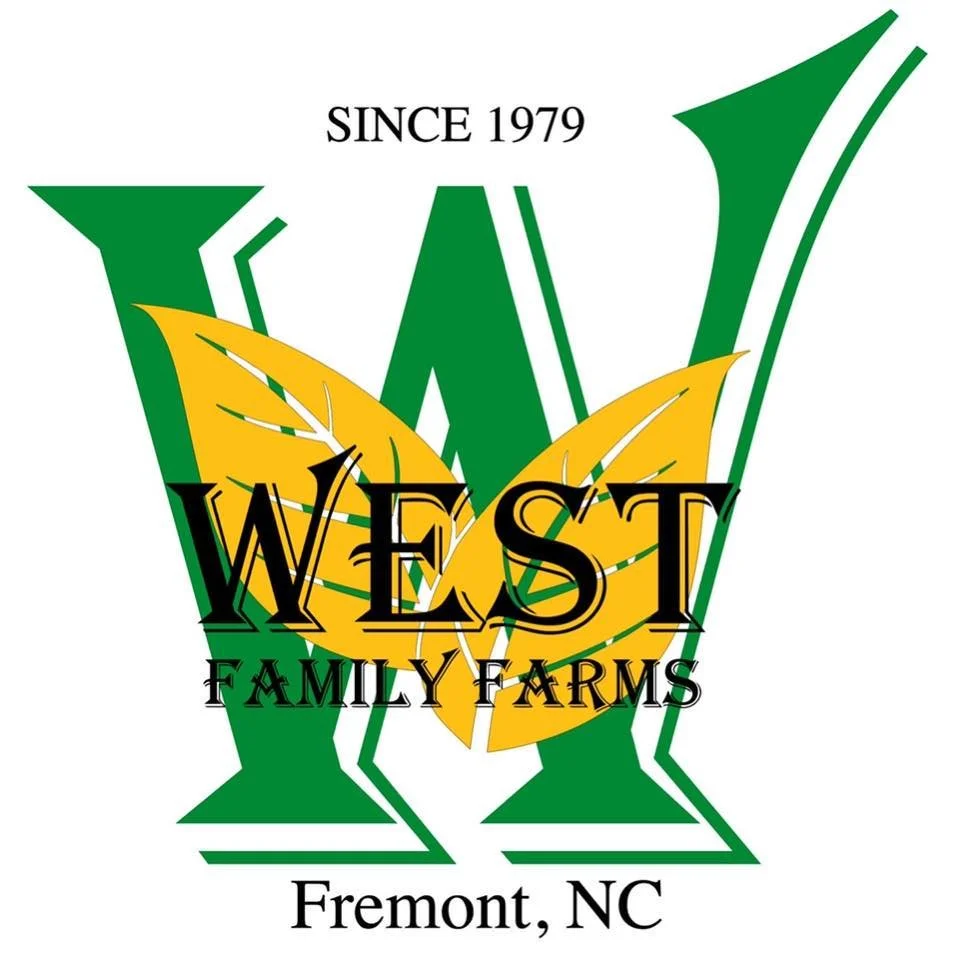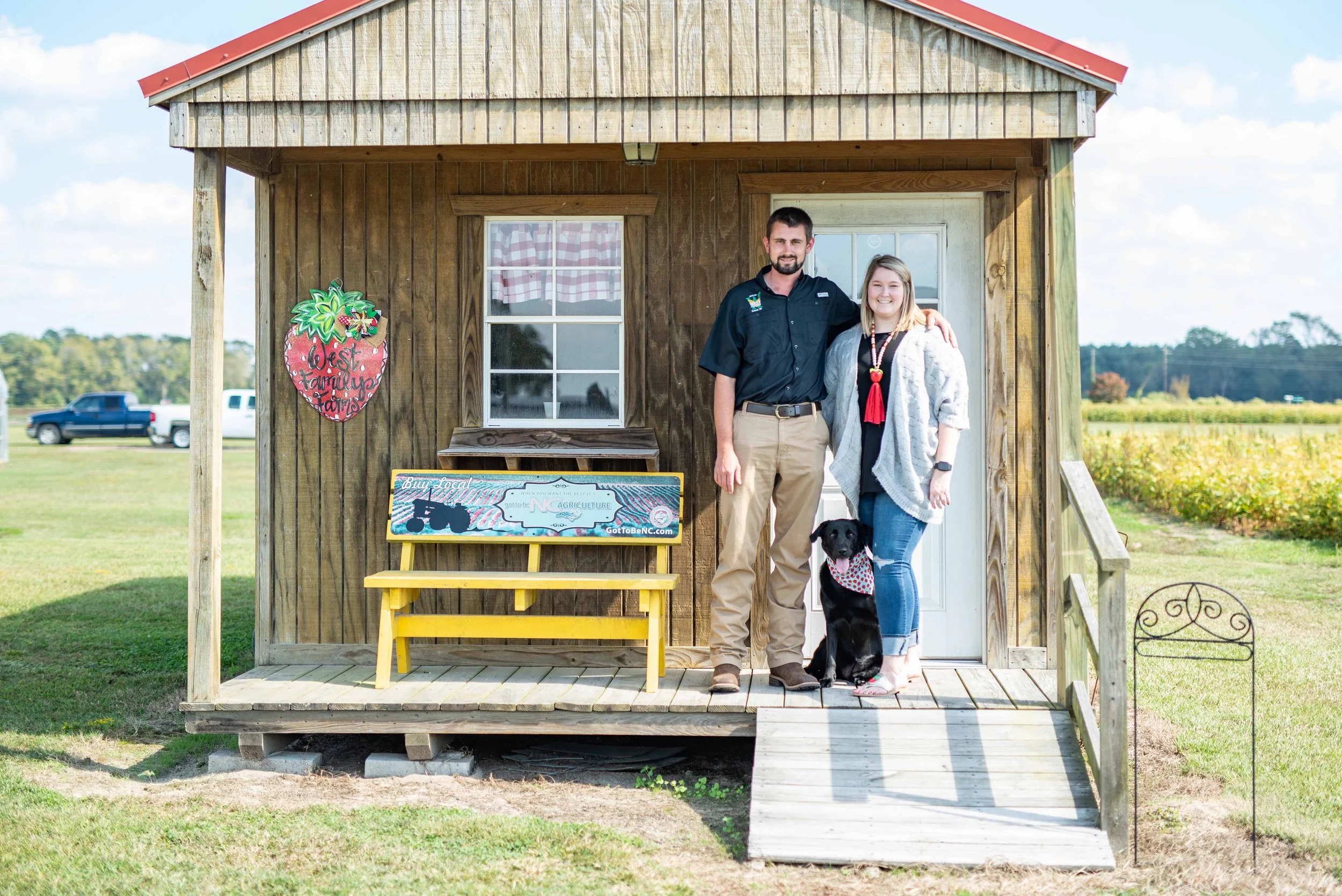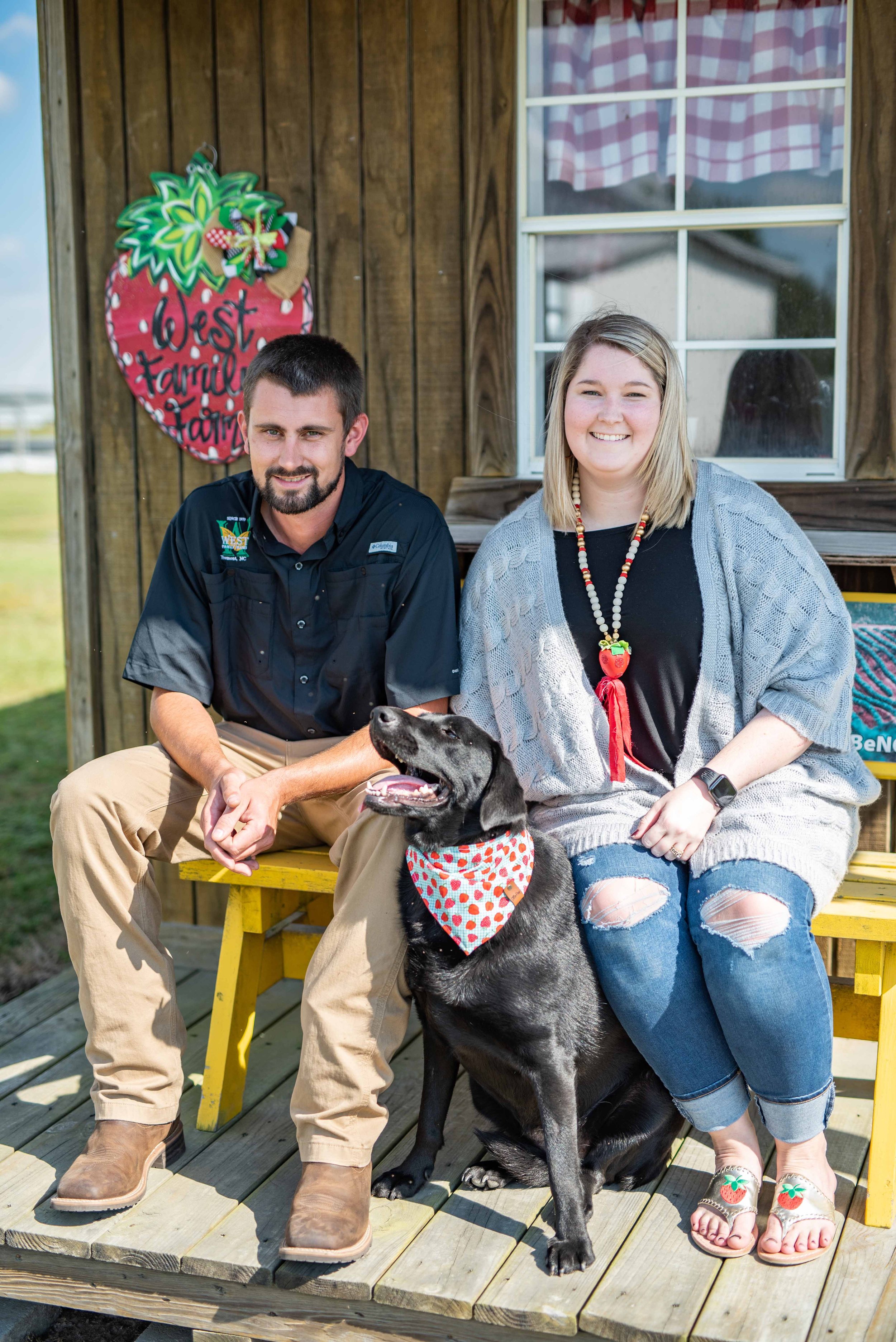Farmkeepers Blog
The Farmkeepers is the official blog of NC Farm Families. It is here that words will flow, our voice will be heard, a stand will be made, and the farm families of North Carolina will be protected. In these posts, we'll set the record straight. You'll see the faces of the families who feed us. Here, you'll receive all the updates and news. It is here that we will fight for farmers and be the keepers of the farm in NC. We hope you'll join us. Follow along on social media and by joining our email list.
Heaven on the Farm: The Mewborn Family
“The family farm—is more than a business—the family farm is a lifestyle—it is an ideal worth preserving.”
Robin and Wesley Mewborn met in middle school in Duplin County. When they first started dating, Wesley knew nothing about farming; however, Robin had grown up on a multi-generational farm. In 2010, the couple got married. Together, they dreamed of raising their own family on the farm. That dream became a reality in 2014 when they placed their first set of chickens, growing for Case Farms. A few years later, they would add a hog farm and grow for Smithfield.
Although their dream came true, it wasn’t easy. As a first-generation farmer, you start with nothing. When Wesley would ask how he could get started, he was met with statements like, “You don’t. You can’t.” But seven years later, the Mewborns have made it work.
“It just makes me proud to be his wife,” said Robin. “To be that first generation for our children, to grow into that knowing how much work and dedication he’s put into this. His dedication has created this.”
Wesley credits a lot of the opportunity to farm to Cape Fear Farm Credit. “If it wasn’t for Farm Credit we wouldn’t have what we have. They have bent over backwards, so in return they’ve enabled those two [their kids] to have something one day,” Wesley said with emotion.
Robin and Wesley with Shannon Bell and Carrie Cumbo from CFFC.
Farm Credit is more than a lender for rural and agricultural communities. They are also a resource. Wesley says that sometimes, before talking to Robin, he’ll call the folks at Farm Credit to ask if something is a smart move or will something work? “When they say yes, I go home and say, ‘hey, Robin guess what?’” said Wesley.
Farm Credit invests in farmers and rural communities because they recognize just how much farmers bring to the table—literally. Thanks to them, families like the Mewborns have the chance to chase their dreams and become first-generation farmers.
“I’m excited for us to be here and farming because that’s what I’ve always wanted to do-- that and raise our kids here,” Robin said. “I love the freedom of it. They can come [to the farm] and learn.”
Being able to do that is special for Robin, as she has fond memories of being picked up from school by her mom to go spend time on the farm with her dad. Now, she gets to do the same thing with her children.
Robin doesn’t just want her own children to learn about farming. She extends those lessons to her own classroom. Robin has taught in Duplin County for 16 years at the same elementary school she attended as a girl. Through Farm Bureau’s Ag in the Classroom, Robin ensures her students are learning all about agriculture through activities like hatching chicks and raised bed gardens. One thing she hopes that her students and her own children realize is that agriculture is a vast field.
“There’s more out there than just farming—welders, electricians, truck drivers—those jobs are available. They can stay in Duplin County and do those jobs,” Robin shared.
Farming and agriculture also offer opportunities for girls too. Robin and Wesley want their daughter Macy (8) to know that “it’s not just a man’s job. There’s something for her here too.” Macy’s favorite day on the farm is when they get new baby pigs or chicks. Meanwhile, her brother, Case (4) loves all things tractor. He can tell you names, models, and colors. He also takes farm work seriously.
“When you pick him up from school, it’s ‘my daddy needs me to check the chicken alarm, or my daddy needs me to go to the hog houses and pump.’ He comes ups with it all on his own,” said Wesley.
In many ways Wesley and Robin farm for their children—all three of them, although you will notice only two of them are with them today. Robin and Wesley’s firstborn, Layla was diagnosed with brain cancer when she was only 3 months old. The young family went to Duke every week for treatments. At the time, they were just starting to build their chicken houses, so were not farming yet. Robin was 7 months pregnant with Macy, and Wesley had been laid off his job.In October of 2014, their first set of chickens arrived. For the Mewborns, farming was a blessing in so many ways. Not only did it provide a job for Wesley, but it allowed for more flexibility as they continued traveling with Layla for care and treatment.
Layla passed away on her fourth birthday in 2016 at Duke. She was in palliative care for two weeks prior, and Wesley was able to be there every day, something that he might not have been able to do with another job.
Today, they continue to remember Layla in all they do, including farming. Their smaller hog farm is named LMC after their three children.
Robin, Macy, Wesley, and Layla
Layla and Wesley
“In our farming day to day, we remember Layla. She is also our child. Honoring her in just naming our farm and in the day to day is a huge part of our story. She is a part of this even though she is not here, and it gives us that drive,” shared Robin.
They say when you see a cardinal, it is a visitor from heaven; every time they see a cardinal, they remember Layla. Frequently, the family will see red birds at the farm. For some, the farm is a slice of heaven on Earth, and for the Mewborns, that is especially true.
West Family Farm: Deep Community Roots
Lee West is the fourth generation to work on his family’s farm. Although, there’s been difficult times, the farm has grown. Through the years, they’ve never lost sight of their deep family and community roots.
Lee’s great-grandfather had a stroke when Lee’s grandfather, Jerry, was only 13. Most of the farm equipment was sold and the farm was rented out. When his grandfather became an adult, he worked in a local manufacturing plant while farming part time. When his manufacturing job told him he’d need to move out West, it was time for a change. Fremont was home, and that’s where he wanted to stay. So, in 1979, he started farming full-time. There were very few acres at the time and only 1-2 tractors. Today, the farm has grown to 6,000 acres where they grow many crops (read part 1 of the West’s story to learn what they grow).
While they’ve grown, their community and heritage are just as important as it was in the 60’s. Their growth wouldn’t be possible without the community.
Of the 6,000 acres they tend, the Wests rent 5,500 of those acres from landowners. Because the county is cut up so badly, they rent from more than 120 landowners. The agreement benefits both parties by providing income for landowners and land for the West’s crops. The Wests are focused on meeting the expectations of landowners. “Each one has their own concerns and how they want things treated,” says Lee. He adds that “you have to agree with your community and share the road.”
Northern Wayne County has been growing for the last 20 years. Lee says that his dad, Craig, talks about how used to you could drive a tractor 3-4 miles down the road before having to pull over for cars. Now they can hardly get out of their driveway. The Wests understand the importance of mutual respect and try hard to do their part in the community.
“Being a good neighbor and being a good person in the community, you hope that your community will work with you and allow you to get to your fields and grow your hogs,” Lee said.
For some, 6,000 acres may sound huge, and hardly a family farm, but Lee says that they are definitely a family farm. He, his dad, his uncle, and other family members are hands-on every day. When asked what it meant to be a family farm, Lee said, “It’s the pride. We all know what’s going on. We can tell you everyone’s name, their kids, and where they’re from. As progression progresses, we have had to tend more acres, buy more equipment, hire more workers, but I still like that smaller family farm mentality we have. We may not be as efficient as other farms, but we take pride in it and do the best we can.”
Lee also wishes that people understood that farming isn’t just about driving tractors. It’s a lot of business. The Wests have a farm office where Lee’s aunt, Lynn, and grandmother, Audrey, handles office reports, payrolls, taxes, and a host of other paperwork. That business is a big part of the local economy, benefiting many local businesses in the community.
For the Wests, business, farming, and the community are combined by taking the time to sit on various boards. In addition to local county groups, Craig is a board member of NC Sweetpotatoes and the Tobacco Growers Association while Brad sits on the board at NC Peanut Growers. Sitting on these boards allows these gentlemen to give not just a farmer’s perspective, but a resident of rural Wayne County. They are voices for and in their community.
Apart from being a good neighbor or business partner with those in the community, the Wests are also passionate about building relationships with their community. Many of those relationships are built over strawberries. In 2013, Lee’s aunt and uncle started a strawberry patch, and in 2019, Lee and his wife, Madison, took it over.
“My favorite part about strawberries is Saturdays. I get to see everybody from all over Wayne County. They bring their kids for the U-pick. Our customers come back week after week and year after year, and I think that’s the coolest part,” Madison said.
The effort is one of the heart, not necessarily for business.
“The strawberries are for the community more or less now,” Lee says. “The strawberries can be tough. They take a lot of time.”
Yet, you can find Madison in the strawberry barn on Saturdays during strawberry season, excited to see those in the community.
“They’ve become family to us too. Community is the biggest part of farming, to me,” Madison shares.
Lee & Madison at the Fremont Christmas Parade
West Family Farm: Here’s to Hoping
“I can’t think of another job that I’d enjoy as much and take pride in as what I do here [on the farm]. It can be tough, but I can’t think of another job I’d rather have.”—Lee West, Fremont, NC
Farmers are eternal optimists. The saying goes, “they have to be, or they wouldn’t still farm.” Bad weather, low commodity prices, a pandemic...farmers all over the country are still farming with a flame of hope and pure grit that is rarely seen. The West family is no different.
Lee West, a sixth-generation farmer, and wife Madison live in Fremont, NC, on their family’s third-generation farm, where three generations still work. “It’s definitely a family farm,” Lee says of West Farms. The family is hands-on every day. Each does their part to grow crops and livestock.
Together the family works to grow sweetpotatoes, corn, soybeans, tobacco, cotton, peanuts, turkeys, pigs, strawberries, sweet corn, and other produce.
Lee, his dad Craig, uncle Brad, and brother Luke, focus on the crop side, while Lee’s mom, Nell, looks after the turkeys. Madison is your go to girl for strawberries. Lee’s Aunt Lynn handles a lot of the office work, and his grandmother, Audrey, who says she’ll retire every year but never does, also heads to the office every day—something that’s good for her and the rest of the family.
Working together 80-90 hours a week with your family is not for everyone, but for Lee it means a whole lot.
“Running the big John Deere tractors is nice, but the thing that probably means the most and is the most important to me, and I enjoy the most is the legacy. The same farm my grandaddy worked, my dad worked, and now I work, that just really means a lot to me—being able to work with my family and spend time with them,” Lee shared.
For Lee, farming is all he’s known, but for wife, Madison, the same cannot be said. Madison grew up in insurance as the family business.
“I knew nothing about farming at all until about nine years ago when we started dating,” Madison said. She got thrown into farming from the start. On their first date, Lee picked her up and went straight to move a piece of equipment before their date officially started. Nine years later, Madison and Lee are now married, recently celebrating their first wedding anniversary.
As her Instagram handle @talesofanaccidentalfarmgirl suggests, Madison didn’t mean to become a farmer, but here she is, loving it and “wouldn’t trade it at all.” Although, she works off the farm at a financial institution Monday-Friday, she runs the family’s strawberry patch. March-May is strawberry season and top of mind for Madison. You can find her at the strawberry barn during that time with their dog, Millie, selling strawberries.
Taking the Good with the Bad
Of course, farming hasn’t been just strawberries and tractors for the Wests. They’ve been hit with some hard times, especially of late.
Lee points to the last day they had pigs on the farm—January 2021
Two months before Madison and Lee’s wedding, they got the call that Goldsboro Milling was shutting down their hog operations. It was news that shook farmers and communities across eastern North Carolina. For the Wests who had just bought a 2,000 head sow farm less than a year before, it was an extremely hard blow.
“It was stressful. We didn’t know what was going to come of it. I was at work when I read it, and didn’t know what to think,” Madison said.
Today, their barns stand empty. The silence is eerie. The emptiness swallows you. There are dusty boots in the farm office, abandoned. Birthday balloons lay deflated from better times. The calendar shows January 2021—the last days.
They wanted to diversify their farm and income with the pig farm. Now, they must rely on turkeys and crops to pay for empty hog barns.
Lee is quick to say that this wasn’t just a blow to them, though. This impacted families across the community, especially those that worked at the hog farm.
“When you have a group of 10-11 workers that are what I would call, cream of the crop, it’s hard to turn them loose. Some of those guys have been here 20 years or more. That’s their career. That’s tough on them,” said Lee of the team that worked at the hog farm, most of which stayed on from the previous owner when the Wests bought the farm. “You wonder, will they be able to find a job? It’s not just our farm that’s shutting down; it’s the whole industry around here, so the job market for those guys is minimal.”
The Wests tried to find jobs for the hog farm employees elsewhere on their farm, but it wasn’t the same. Losing a career that you loved and did for decades is hard. For a family that considers their employees extended family, it was an added heartbreak to already devastating news.
And yet, despite all of this, they are hopeful for the future. They aren’t giving up.
“We’ve got to take the hand we’re dealt and do the best we can with it and hope something comes along soon,” Lee said. “We bought a hog farm. We’re serious. We want to be in the hog industry.”
So, they continue. They’re still farming. Still planting and harvesting. Still praying and hoping.
While they wait for something to come along, they are providing grain through their crops to feed mills across the state. That grain will ultimately be fed to other farmers’ poultry and hogs. So, while they currently don’t have pigs, they are still very much a part of the hog industry through the crops they grow and their hopeful hearts.
Farmers are optimists. Really, it’s the only way to continue farming. As Lee said, “you have to take the good with the bad.”
As Madison decorated their Christmas tree this year, she snapped a photo of a pig ornament and posted it online with the caption: “Some cultures believe that pigs bring good health and good fortune. We hung this special one on our tree again this year with the hopes that it will fill our hog houses back up in 2022.”
Here’s to hoping. Here’s to taking the good with the bad. Here’s to farmers, the eternal optimists.


